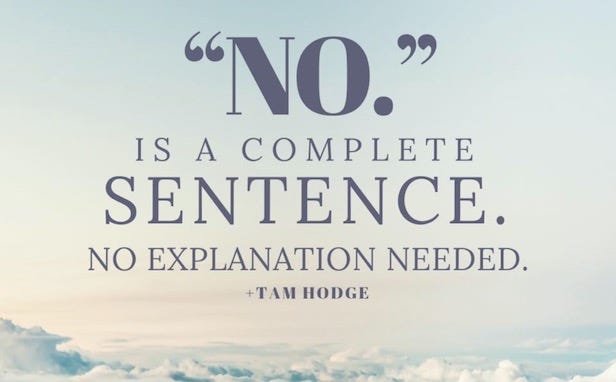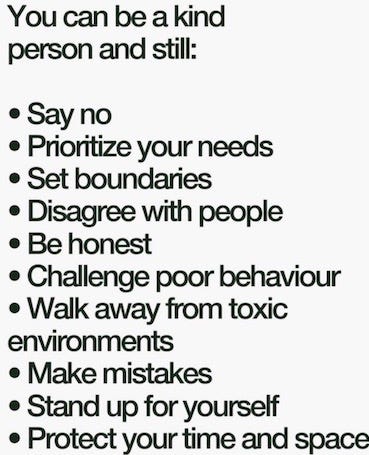(Readers, there should be an audio button at the top of this post allowing you to listen to this content on your device. It is not my voice, although I hope you find it pleasant.)
Years ago I was at sales training and the speaker confidently walked across the stage and announced, “NO is a complete sentence!” My "Journalism School” antenna extended to full alert, my neck stiffened and I straightened in my chair. My internal grammar hammer was banging in my head, “Raise your hand to challenge this travesty.” Luckily, I restrained myself, however, the speaker had my full attention.
The context of this grammatically controversial assertion was about negotiations. The trainer explained how to confidently say NO and walk away from a bad deal for the company. There are also many personal uses for confidently saying NO. When someone asks, “Can you stop by my house and water my plants while I am on vacation?” You can smile and say, “No.” How many times have you offered further explanation? If you are like me, probably more than is required.
Over the years, I have become more comfortable with a polite “no” and a brief explanation in a work situation. Professionally, in most of my roles, a one-word “no” would have been frowned upon with a few exceptions. No is acceptable if the question posed is, “Brenda are you available to work a health fair on Saturday?”
However, if my sales manager said, “Brenda I need everyone to participate in this upcoming series of weekend health fairs.” A plain “no” was not an acceptable response. If there was a reason I couldn’t participate, it would have warranted a private conversation between me and the manager. Many of my corporate behaviors have influenced how I behave in my personal life.
What happens when you retire and leave the paid workforce? Is NO less acceptable as a response?
In my opinion, it depends. I have no problem with personal boundaries and I don’t over-explain to family or friends. After 46 years in corporate life, I will generally provide a simple explanation. “No, I have plans that weekend.” “No, I have a deadline for a project I am completing.” I have a rare friend or family member who may ask for more, “Oh, where are you headed?” or “Oh, what are you working on?” And, if we are close and often discuss my travel plans or writing projects, I’m still not overly concerned with providing more context. However, my no is still a firm no.
Some retirees face the grandchild babysitting challenge. Adult children want to know why grandma or grandpa can’t take care of their little ones. (Isn’t that the reason you exist?) Again, the response often depends on the situation and relationship dynamic. However, it is still important to set boundaries. As difficult as it is to remember when the little ones are involved, we are only declining the opportunity. We are rejecting the request— we are not rejecting our children or their little ones.
How do we handle the pushy person? What if we say no and the requestor wants to explain how to manage our time so we can turn our “no” into their “yes?” It happens. I remember friends wanting me to pick them up at the Indianapolis Airport at rush hour. I politely declined and the requestor wanted to know what I was doing. I kindly repeated, “I am not available; it doesn’t matter what I’m doing.” My friends understood and made other arrangements. We are still friends.
Don’t feel bad about saying no. Ultimately, people have more respect for those with healthy boundaries. An occasional decline encourages the requestors to feel comfortable saying no when it is necessary. While initially saying no may feel uncomfortable, once it becomes a habit, saying no helps reduce stress and burnout because we are not over-committed. Being intentional about saying “yes” gives us better control over our time.
This is not meant to ignore that there are Older, Bolder & Better! blog readers with bullies, narcissists, and difficult people in their lives. These situations are different. Over the years these readers have most likely developed an arsenal of responses. These readers already know it is important to be prepared for a reaction and/or pushback. They endure responses ranging from a sarcastic, “What are you doing, Mr. Busyperson,” to a guilt-tripping, “Oh, no more time for your dear old Dad,” punctuated with a deep sigh.
I have been told that it is important to stay calm and end the conversation as quickly as possible with bullies and narcissists. The longer they talk, the more time the difficult person has time to debate, become confrontational, or begin pushing buttons and boundaries. People in these situations have shared with me, that they may prepare a script if the call is preceded by a text or email.
We are responsible for our well-being and confidently saying no models self-respect for those around us. Our mental energy and personal peace are important, protect them, and have a great week! Please share this post with someone you love.







I will share and would like to repost it in my blogs in the near future. 💚
I once reviewed a play where you got to decide what characters to follow through the maze of a venue, learning what that character knew about the story but not what others did. In that review, I noted something that has stayed with me and is echoed in your wonderful piece. In choosing what to see, what have I chosen not to see? These choices matter. Over the years, saying "no" has been like a world of possibilities opening up . . .